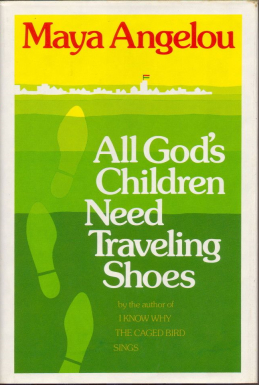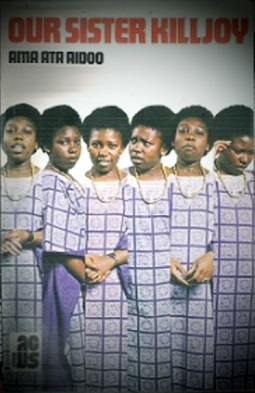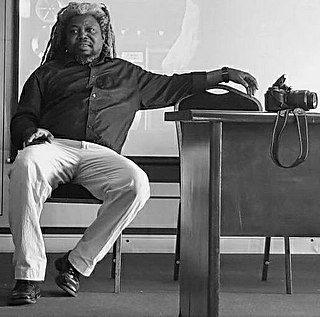Related Research Articles

Maya Angelou was an American memoirist, poet, and civil rights activist. She published seven autobiographies, three books of essays, several books of poetry, and is credited with a list of plays, movies, and television shows spanning over 50 years. She received dozens of awards and more than 50 honorary degrees. Angelou's series of seven autobiographies focus on her childhood and early adult experiences. The first, I Know Why the Caged Bird Sings (1969), tells of her life up to the age of 17 and brought her international recognition and acclaim.

Ama Ata Aidoo was a Ghanaian author, poet, playwright, politician, and academic. She was Secretary for Education in Ghana from 1982 to 1983 under Jerry Rawlings's PNDC administration. Her first play, The Dilemma of a Ghost, was published in 1965, making Aidoo the first published female African dramatist. As a novelist, she won the Commonwealth Writers' Prize in 1992 with the novel Changes. In 2000, she established the Mbaasem Foundation in Accra to promote and support the work of African women writers.
Jayne Cortez was an African-American poet, activist, small press publisher and spoken-word performance artist whose voice is celebrated for its political, surrealistic and dynamic innovations in lyricism and visceral sound. Her writing is part of the canon of the Black Arts Movement. She was married to jazz saxophonist Ornette Coleman from 1954 to 1964, and their son is jazz drummer Denardo Coleman. In 1975, Cortez married painter, sculptor, and printmaker Melvin Edwards, and they lived in Dakar, Senegal, and New York City.

Nii Ayikwei Parkes, born in the United Kingdom to parents from Ghana, where he was raised, is a performance poet, writer, publisher and sociocultural commentator. He is one of 39 writers aged under 40 from sub-Saharan Africa who in April 2014 were named as part of the Hay Festival's prestigious Africa39 project. He writes for children under the name K.P. Kojo.

Efua Theodora Sutherland was a Ghanaian playwright, director, dramatist, children's author, poet, educationalist, researcher, child advocate, and cultural activist. Her works include the plays Foriwa (1962), Edufa (1967), and The Marriage of Anansewa (1975). She founded the Ghana Drama Studio, the Ghana Society of Writers, the Ghana Experimental Theatre, and a community project called the Kodzidan. As Ghana's earliest playwright-director, she was an influential figure in the development of modern Ghanaian theatre, and helped to introduce the study of African performance traditions at university level. She was also a pioneering African publisher, establishing the company Afram Publications in Accra in the 1970s.

Mĩcere Gĩthae Mũgo was a Kenyan professor, playwright, author, activist and poet. She was a literary critic and professor of Literature, Creative Writing and Research Methods in the Department of African American Studies at Syracuse University. She was forced into exile in 1982 from Kenya during the Daniel Arap Moi dictatorship for activism and moved to teach in the United States, and later Zimbabwe. She taught Orature, Literature, and Creative Writing.

All God's Children Need Traveling Shoes, published in 1986, is the fifth book in African-American writer and poet Maya Angelou's seven-volume autobiography series. Set between 1962 and 1965, the book begins when Angelou is 33 years old, and recounts the years she lived in Accra, Ghana. The book, deriving its title from a Negro spiritual, begins where Angelou's previous memoir, The Heart of a Woman, ends — with the traumatic car accident involving her son Guy — and closes with Angelou returning to America.

A Song Flung Up to Heaven is the sixth book in author Maya Angelou's series of autobiographies. Set between 1965 and 1968, it begins where Angelou's previous book All God's Children Need Traveling Shoes ends, with Angelou's trip from Accra, Ghana, where she had lived for the past four years, back to the United States. Two "calamitous events" frame the beginning and end of the book—the assassinations of Malcolm X and Martin Luther King Jr. Angelou describes how she dealt with these events and the sweeping changes in both the country and in her personal life, and how she coped with her return home to the U.S. The book ends with Angelou at "the threshold of her literary career", writing the opening lines to her first autobiography, I Know Why the Caged Bird Sings.

The themes encompassed in African-American writer Maya Angelou's seven autobiographies include racism, identity, family, and travel. Angelou (1928–2014) is best known for her first autobiography, I Know Why the Caged Bird Sings (1969). The rest of the books in her series are Gather Together in My Name (1974), Singin' and Swingin' and Gettin' Merry Like Christmas (1976), The Heart of a Woman (1981), All God's Children Need Traveling Shoes (1986), A Song Flung Up to Heaven (2002), and Mom & Me & Mom (2013).

Louise Meriwether was an American novelist, essayist, journalist and activist, as well as a writer of biographies of historically important African Americans for children. She is best known for her first novel, Daddy Was a Number Runner (1970), which draws on autobiographical elements about growing up in Harlem, New York City, during the Depression and in the era after the Harlem Renaissance.

Our Sister Killjoy: or Reflections from a Black-eyed Squint is the debut novel of Ghanaian author Ama Ata Aidoo, first published by Longman in 1977. It has been called "a witty, experimental work whose main point is a stylish dismissal of characteristic attitudes of both the white world and the black middle class." It was described by one reviewer as "a strikingly unusual and pertinent commentary on the African encounter with the West, on European soil.... Without being a conventional narrative or biography, it is a text that uses the framework of an account of a state-sponsored visit to Germany by a young Ghanaian woman to analyse what Europe is and does to those Africans whom it 'sponsors' and educates."

Yaba Badoe is a Ghanaian-British documentary filmmaker, journalist and author.
The history of African Americans in Ghana goes back to individuals such as American civil rights activist and writer W. E. B. Du Bois (1868–1963), who settled in Ghana in the last years of his life and is buried in the capital, Accra. Since then, other African Americans who are descended from slaves imported from areas within the present-day jurisdiction of Ghana and neighboring states have applied for permanent resident status in Ghana. As of 2015, the number of African American residents has been estimated at around 3,000 people, a large portion of whom live in Accra.

Margaret Yvonne Busby,, Hon. FRSL, also known as Nana Akua Ackon, is a Ghanaian-born publisher, editor, writer and broadcaster, resident in the UK. She was Britain's youngest and first black female book publisher when she and Clive Allison (1944–2011) co-founded the London-based publishing house Allison and Busby in the 1960s. She edited the anthology Daughters of Africa (1992), and its 2019 follow-up New Daughters of Africa. She is a recipient of the Benson Medal from the Royal Society of Literature. In 2020 she was voted one of the "100 Great Black Britons". In 2021, she was honoured with the London Book Fair Lifetime Achievement Award. In 2023, Busby was named as president of English PEN.
Meri Nana-Ama Danquah is a Ghanaian-American writer, editor, journalist and public speaker, whose name at birth was Mildred Mary Nana-Ama Boakyewaa Brobby. She is best known for her 1998 memoir Willow Weep for Me: A Black Woman's Journey Through Depression. Her short story "When a Man Loves a Woman" was shortlisted for the 2022 AKO Caine Prize for African Writing.
Esi Sutherland-Addy is a Ghanaian academic, writer, educationalist, and human rights activist. She is a professor at the Institute of African Studies, where she has been senior research fellow, head of the Language, Literature, and Drama Section, and associate director of the African Humanities Institute Program at the University of Ghana. She is credited with more than 60 publications in the areas of education policy, higher education, female education, literature, theatre and culture, and serves on numerous committees, boards and commissions locally and internationally. She is the first daughter of writer and cultural activist Efua Sutherland.
The Mbaasem Foundation is a foundation established by Ghanaian writer Ama Ata Aidoo in Accra, Ghana, in 2000. It is a nonprofit foundation dedicated to supporting and promoting the work of African women writers, to "establish and maintain a writing place for women". In 2002 the rented headquarters of the foundation was "likened to the transformation of Ernest Hemingway's home in Chicago into a literary haven and museum". The Foundation states its mission as being "To support the development and sustainability of African women writers and their artistic output", and as its goal: "To create an enabling environment for women to write, tell and publish their stories."
Rashidah Ismaili, also known as Rashidah Ismaili AbuBakr, is a poet, fiction writer, essayist and playwright who was born in Cotonou, Benin, West Africa, and in the 1950s migrated to the US, where she still lives in Harlem, New York City. She was part of the Black Arts Movement in New York in the 1960s. She is also an arts and culture critic and taught literature by French- and English-speaking African writers in higher education institutes for more than 30 years.

Nana Sandy Achampong is a Ghanaian media practitioner, novelist, poet and educator. He has worked in the fields of journalism, public relations, advertising, marketing, the visual arts and literature in Ghana, the United Kingdom and the United States. He is an author of books that cover the different genres of poetry, play, for children, fiction, non-fiction, Christian, media and anthology. He currently teaches at the African University College of Communications (AUCC), where he is also the Director of the Ama Ata Aidoo Centre for Creative Writing.
The Dilemma of a Ghost is a play by Ghanaian writer Ama Ata Aidoo that was first performed in March 1964 for three nights at the Open Air Theatre of the University of Ghana, Legon, where the author was in her final year of studies, a few months away from graduating. The play was published by Longman the following year, making Aidoo the first published African woman dramatist. It was subsequently published in an edition with Aidoo's second play, Anowa (1970), both works dealing with the differences between Western culture and African traditions.
References
- ↑ "Organization of Women Writers of Africa (OWWA)". UIA Global Civil Society Database. Retrieved 9 September 2022.
- 1 2 Ruffin, Kimberly N. (2010). Black on Earth: African American Ecoliterary Traditions. Athens and London: The University of Georgia Press. p. 151. ISBN 9780820337531.
- ↑ "OWWA’s First 20 Years" Archived March 23, 2013, at the Wayback Machine , Organization of Women Writers of Africa, Inc.
- 1 2 Kingan, Renee M. (2016). "Superheroic Subversion through Music and Movement in Cortez's 'Samba is Power'". In Laura Hinton (ed.). Jayne Cortez, Adrienne Rich, and the Feminist Superhero: Voice, Vision, Politics, and Performance in U.S. Contemporary Women's Poetics. Rowman & Littlefield. p. 187. ISBN 9781498528740.
- ↑ Williams, Lena, "Literary Women With Roots In Africa", The New York Times , October 16, 1997.
- ↑ Goldman, Vivien (2019). Revenge of the She-Punks: A Feminist Music History from Poly Styrene to Pussy Riot. University of Texas Press. ISBN 9781477318461.
- ↑ Hall, Melissa Mia (4 November 2010). "Due, Rananarive". In S. T. Joshi (ed.). Encyclopedia of the Vampire: The Living Dead in Myth, Legend, and Popular. Abc-Clio. p. 98. ISBN 9780313378348.
- ↑ "Poet-performer Jayne Cortez dies in NY at age 78", The Washington Examiner . Saturday, January 5, 2012.
- ↑ "Yari Yari Ntoaso: Continuing the Dialogue – Accra, Ghana", Institute of African American Affairs, New York University. 2013
- ↑ Osabutey, Phyllis D., "Africa: Women Writers of African Ancestry Hold Conference in Accra", The Chronicle, May 20, 2013.
- ↑ "'Yari Yari Ntoaso: Continuing the Dialogue'—OWWA Conference Features Caribbean Writers". January 29, 2013. Retrieved September 10, 2022.
- ↑ "Yari Yari Ntoaso Confab Kicks Off Today in Accra – Programme Line-up". Creative Writing Ghana. May 16, 2013. Retrieved 10 September 2022.
- ↑ Rubin, Rachel Lee, ed. (2018). ""Wigs and Skin": Colonialism According to Ama Ata Aidoo". Creative Activism: Conversations on Music, Film, Literature, and Other. Bloomsbury Publishing USA. ISBN 9781501337222.
- ↑ Snodgrass, Mary Ellen, ed. (2016). "Angelou, Maya (1928-2014)". American Women Speak: An Encyclopedia and Document Collection of Women's. ABC-CLIO. p. 43. ISBN 9781440837852.